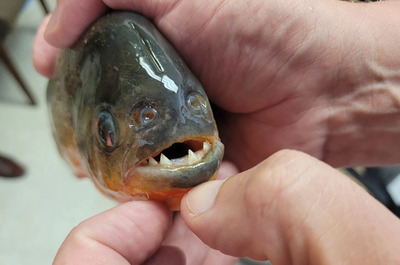
Can piranhas see in the dark at night?

The Enigmatic Nocturnal World of Piranhas
As denizens of freshwater ecosystems, piranhas have long captured the fascination and, sometimes, fear of those intrigued by aquatic life. While their reputation as formidable predators is well-established, there remains a shroud of mystery around their nocturnal activities. In this exploration, we delve into the intriguing question: Can piranhas see in the dark at night? Examining the unique adaptations of their eyes and understanding their behavioral patterns offers a glimpse into the enigmatic world of piranhas after sunset.
Curiosity about the nocturnal abilities of piranhas is not unwarranted. These infamous freshwater predators are known for their keen senses, but do they possess the capability to see in the dark?
The Eyes of the Predator
Piranhas, like many other creatures that inhabit dimly lit environments, have developed specialized adaptations in their eyes to enhance their vision during low light conditions. Their eyes are relatively large and have a high number of rod cells, which are photoreceptor cells responsible for detecting light. This adaptation allows piranhas to capture more available light in darker surroundings, aiding in their ability to navigate and locate prey.
Nocturnal Behavior Patterns
While piranhas may have enhanced vision in low light, it's essential to note that they are not strictly nocturnal. Piranhas are known for their diurnal behavior, meaning they are most active during the day. However, some species may exhibit crepuscular behavior, being more active during dawn and dusk. During these low light periods, their specialized eyes contribute to efficient hunting and navigating in semi-dark conditions.
Environmental Factors
The ability of piranhas to see in the dark is also influenced by environmental factors. In their natural habitats, water clarity, the presence of vegetation, and ambient light levels play significant roles. In murky waters or densely vegetated areas, their specialized vision becomes even more crucial for survival.
Adaptation in Captivity
For piranhas kept in captivity, the lighting conditions in the aquarium or tank may impact their behavior. Providing subdued lighting during the night might allow them to exhibit more natural behaviors associated with low light conditions. However, it's crucial to strike a balance, as too much or too little light can stress the fish.
Conclusion
While piranhas may not be true nocturnal hunters, their eyes are adapted to function well in low light conditions. This adaptation aligns with their habits, enabling them to thrive in the diverse environments they inhabit. Understanding these aspects of piranha behavior contributes to better care and appreciation of these fascinating aquatic creatures.